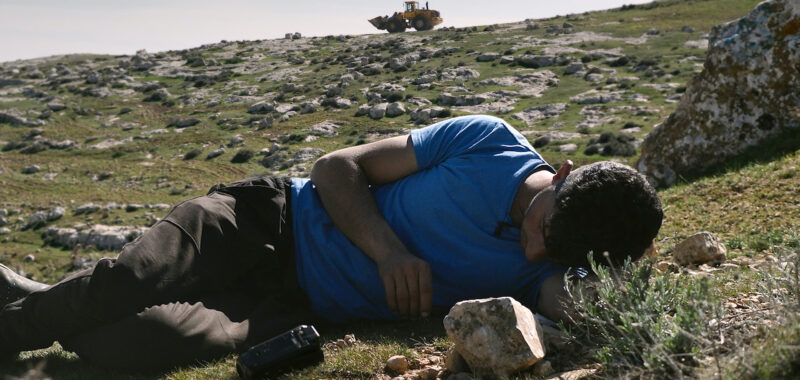For nearly a year the world has watched Israel’s military kill tens of thousands of Palestinians and expel most of Gaza’s 2.3 million people from their homes. Many of us in the United States and other distant nations flick through images of massacres on our phones, from the comfort of our beds, or during the luxurious monotony of a train commute. No Other Land is the first major film about the occupation since the events of October 2023, and to see the horror of apartheid receive undivided attention on the big screen is revelatory.
Co-director and Palestinian activist Basel Adra grew up fighting for his mountainous village region of Masafer Yatta to exist; his parents’ protest footage doubles as his home videos. In 2019, Adra linked up with Israeli journalist Yuval Abraham to document the destruction, which ramped up in 2022 after Israel’s high court green-lit the forced expulsion of Masafer Yatta residents so that soldiers could use the land as “a training ground.”

Adra, Abraham, and collaborators Rachel Szor and Hamdan Ballal get alarmingly close to the bulldozers tearing chunks out of a school, and the barrels of guns that soldiers aim at the chests of civilians. Sometimes a camera falls when soldiers or terrifying rogue settlers push its operator to the ground, creating a manic, abstract collage of rubble. This is no voyeuristic view. The film is tight and expeditious, contained in its story of systematic home demolition, a tactic considered a war crime by Amnesty International and United Nations officials. Death in the Middle East has become normalized and the air strikes make less frequent headlines. By homing in on one area and its people, No Other Land implores us to feel the effects of the war.
Abraham is a potential access point for those who are in solidarity with Palestinians yet insulated from the visceral effects of violent oppression. He learned Arabic, evaded mandatory army service, and chose to risk his life reporting in the West Bank. But ultimately, for him, there is other land. Israel recognizes him as a citizen with voting rights and freedom of movement, manifested visually as the yellow license plate on his car (Palestinians’ green plates allow the government to reject their vehicles at checkpoints or ban them from areas entirely).

The camera lingers on reactions to Abraham’s presence. “It’s your relatives who are doing this to us,” one Masafer Yatta resident says. “Why do you care?” a soldier spits at Abraham, to which he responds, “Because it’s all done in my name.” Beyond a damning eye-witness account of human rights abuses, No Other Land is a case study in the labor of activism and methods of resistance. Between totally devastating scenes, there are moments of respite when Abraham and Adra chat through hookah smoke, under a sky thick with stars. (In this light they look strikingly similar, born a year apart and an hour’s drive away — another visual marker of a difference that is not inherent but manufactured.) At one point, Abraham worries about the view count on a social media post. Adra scoffs at his thirst for immediacy. “This has been going on for decades,” he says. “Get used to failing. You’re a loser.”
After winning the top documentary prize at the Berlinale and selling out its New York Film Festival screenings, No Other Land has yet to secure US distribution. Let’s hope someone is brave enough — this film should be seen by everyone.
No Other Land screens at the New York Film Festival through October 6.

